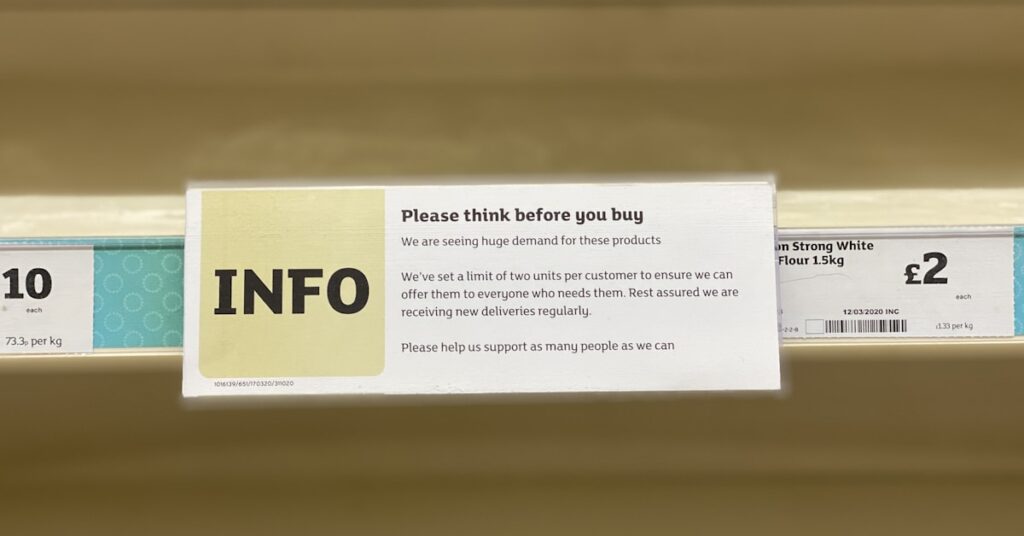Struggling to scale your AI development?
Choosing the right tool feels impossible when balancing demands for high accuracy, budget approvals, and rapid deployment speeds for your models.
A poor choice means wasted time on manual annotation and slow, inaccurate model iterations, putting your entire AI project at risk.
High-quality, accurately labeled data is the bedrock of any successful machine learning model. Without it, even the most sophisticated algorithms will fail to perform in real-world applications.
The right platform solves this by automating tedious labeling tasks, which lets your team focus on building much better models, faster.
For businesses handling sensitive information, my guide on virtual data room software can help ensure secure M&A growth.
In this guide, I’ll review the best data labeling software of 2025. We will explore tools designed to accelerate your development cycles and improve data quality.
You’ll find solutions that fit your budget, integrate with existing ML pipelines, and help you finally achieve consistent training data quality.
Let’s find your solution.
Quick Summary:
| # | Software | Rating | Best For |
|---|---|---|---|
| 1 | Labelbox → | Scaling AI startups | |
| 2 | SuperAnnotate → | Data scientists & ML engineers | |
| 3 | Scale AI → | Enterprise AI programs | |
| 4 | Dataloop → | High-stakes AI projects | |
| 5 | Encord → | ML engineers & data scientists |
1. Labelbox
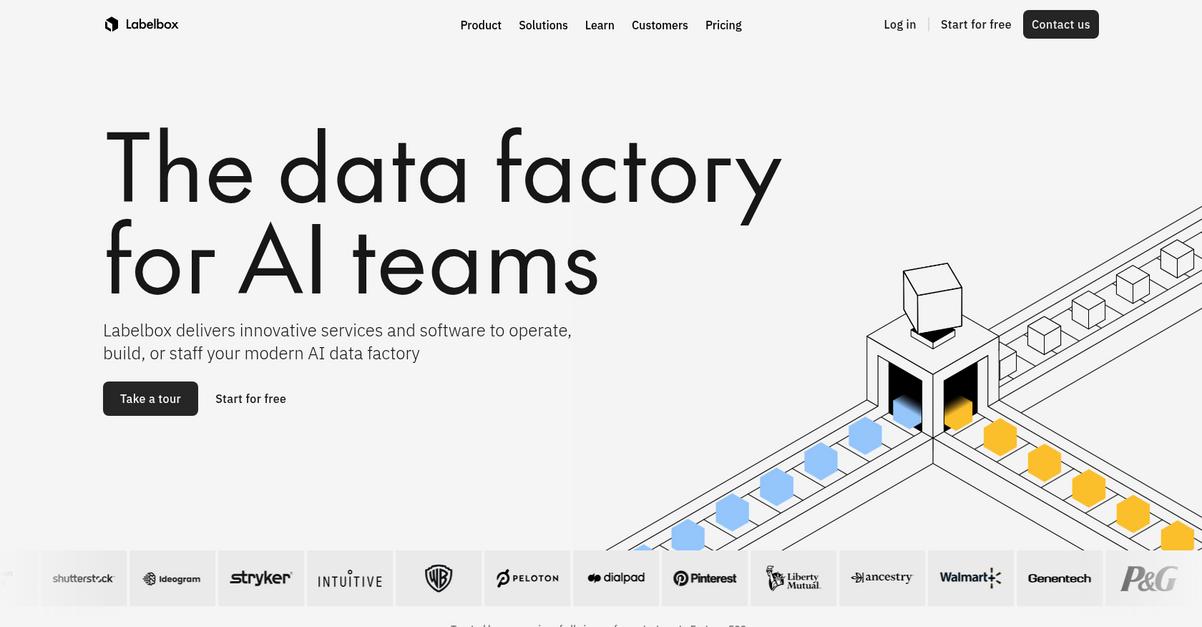
Struggling with consistent, high-quality training data for your AI?
Labelbox offers a comprehensive data factory solution, empowering you to operate, build, or staff your modern AI data factory. This means you can focus on accelerating the development of robust and reliable AI systems.
They understand the pressure for high accuracy and scalability, which is why their platform and services are designed to address these core needs, ultimately helping you refine the right data to train agents effectively. Here’s how to ensure superior data quality.
Labelbox solves the problem of unreliable data and slow model iteration by providing a unified solution for generating unique training data and evaluating models. You can either leverage their fully managed services for on-demand, high-quality labeled data powered by their exclusive network of Alignerrs, or take full control with their best-in-class software.
Their software allows you to evaluate models, enhance existing data, and generate new high-quality data faster, crucial for accelerating model iteration cycles and achieving consistent training data quality. Additionally, Labelbox offers Reinforcement Learning with Verifiable Rewards (RLVR) for automated, clean reward signals and Rubric-Based Evals for fine-grained feedback on subjective tasks.
You can even discover and hire experienced AI trainers directly through Labelbox Alignerr Connect, ensuring seamless integration into your existing processes and tools, and achieving robust model performance across diverse data modalities like complex reasoning, multimodal reasoning, audio, coding, and multilingual tasks. This ensures your team achieves consistent training data quality, accelerated model iteration, and seamless ML pipeline integration.
The result? Accelerated AI breakthroughs with innovative post-training alignment.
Key features:
- Comprehensive Data Factory: Offers software and managed services for on-demand, high-quality labeled data and human evaluations, ideal for scaling AI startups.
- Advanced Model Evaluation: Includes RLVR for automated reward signals and Rubric-Based Evals for fine-grained, human-defined feedback on subjective tasks.
- AI Trainer Staffing: Provides Labelbox Alignerr Connect to help you discover and hire experienced AI trainers, integrating seamlessly with your current workflows.
Labelbox features, pricing, & alternatives →
Verdict: Labelbox stands out as the best data labeling software for AI teams aiming for high accuracy and rapid model iteration. With reported results like a 2X increase in data quality and 35% model accuracy improvement, Labelbox offers a powerful platform and services to address the core challenges of data scientists and ML engineers, particularly in high-stakes applications.
2. SuperAnnotate
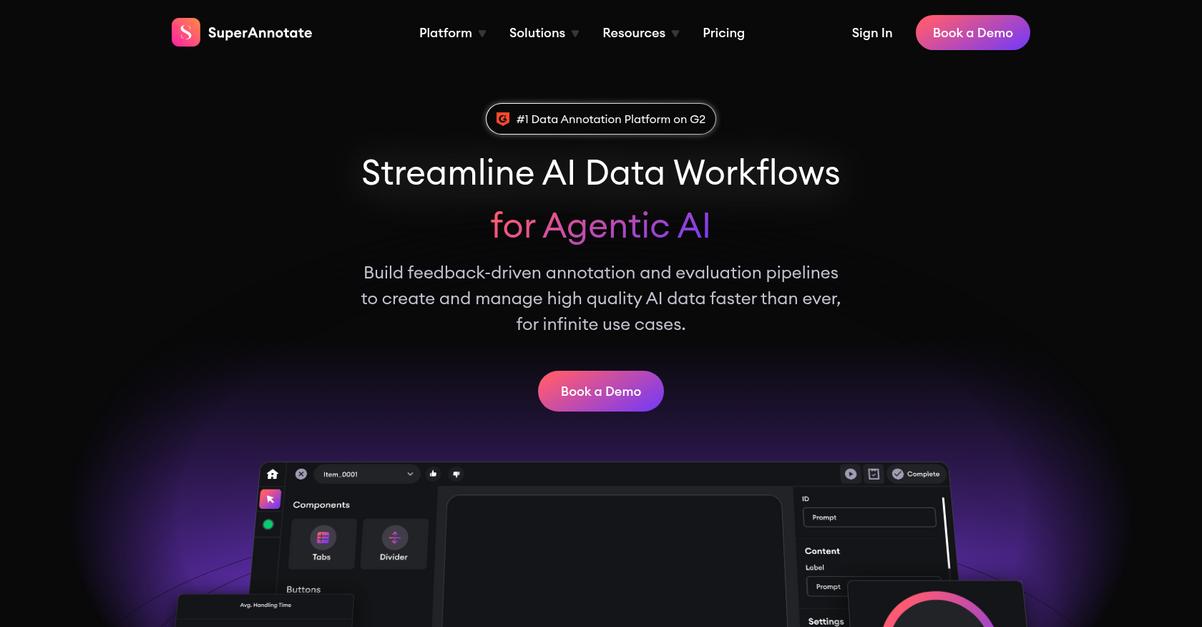
Struggling with accurate, scalable data for your AI models?
You need a platform that streamlines your AI data workflows for multimodal AI, agentic AI, RLHF, and SFT, ensuring your models are more accurate. This means you can focus on building better models, not annotation pipelines, and forget data and integration headaches entirely.
Here’s how you build top-quality training data.
SuperAnnotate helps you turn expert knowledge into AI-ready datasets by allowing you to label multimodal data and feed it directly into your AI development workflows, all in one place. You can unlock proprietary data using custom multimodal annotation forms to transform your domain data into a competitive advantage.
Additionally, you can ensure data quality by setting up custom, multi-layer annotation workflows and expert review cycles to drive higher model precision. You can also fuel AI flywheels by creating feedback-driven iteration with human review and models in the loop for the complete AI development lifecycle. Plus, you can tailor the platform to your specific use case. The result? Accelerated model iteration cycles and consistent training data quality.
Before diving deeper, you might find my analysis of best patient registration software helpful for specific use cases.
Key features:
- Custom Annotation UI: Create the exact annotation user interface you need with drag-and-drop tools or templates, tailored for your specific use cases across diverse data types.
- Advanced Workflow Orchestration: Build robust CI/CD pipelines to automate repetitive tasks and define custom annotation stages with integrated review layers for superior quality control.
- Comprehensive Project Management: Oversee teams and vendors, track performance, compare costs, and ensure quality standardization for all your AI data projects.
SuperAnnotate features, pricing, & alternatives →
Verdict: For data scientists and ML engineers prioritizing consistent training data quality, SuperAnnotate is the best data labeling software. Its multimodal capabilities, custom workflow builder, and robust project management features help accelerate model iteration cycles and minimize annotation errors for high-stakes AI applications.
3. Scale AI
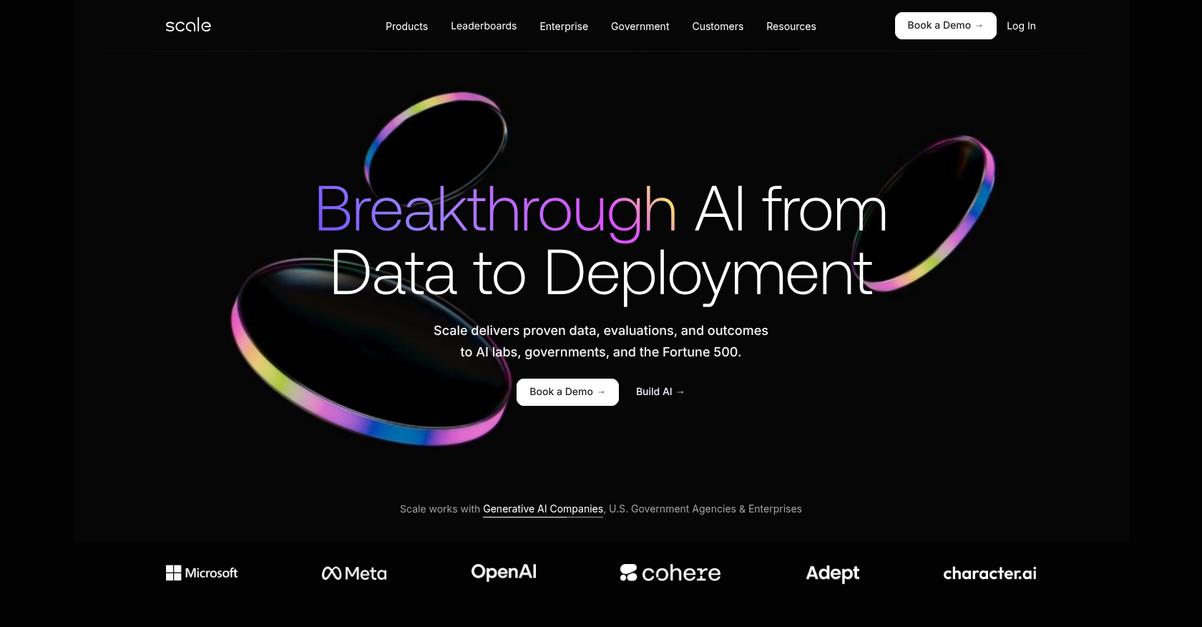
Struggling with consistent training data quality for your AI?
You’re likely facing complex evaluations and the pressure of balancing high accuracy with automation, which Scale AI addresses directly.
The platform provides proven data, evaluations, and outcomes, helping you integrate your enterprise data for long-term differentiation. This means you can build sustainable, successful AI programs.
Here’s how to accelerate your AI.
Scale AI delivers full-stack AI solutions, ensuring you achieve consistent training data quality and accelerated model iteration cycles. You can adapt best-in-class foundation models like OpenAI, Google, and Meta to your specific business data. This enables robust model performance in high-stakes applications. Plus, its Enterprise GenAI Platform powers generative AI, offering RLHF, data generation, and model evaluation. Additionally, agentic solutions transform your expertise into continuously improving systems through human interaction, deeply personalizing products and automating knowledge work.
This streamlines your path to a truly effective AI solution.
Key features:
- Full-stack AI solutions: Provides world-class data, models, agents, and deployment capabilities for enterprises, ensuring comprehensive support from data to deployment for successful AI programs.
- Generative AI Data Engine: Powers advanced LLMs and generative models with capabilities like RLHF, data generation, model evaluation, safety, and alignment, accelerating model development.
- Expert-driven private evaluations: Through SEAL Leaderboards, it offers rigorous benchmarks and model evaluations for AI systems, helping you understand comparative utility and improve model capabilities.
Scale AI features, pricing, & alternatives →
Verdict: For data scientists and ML engineers seeking to accelerate AI development while ensuring high data quality and scalability, Scale AI stands out as the best data labeling software. Its full-stack capabilities, from data engine to model evaluation, help you overcome budget constraints and achieve consistent training data, enabling robust AI performance.
4. Dataloop
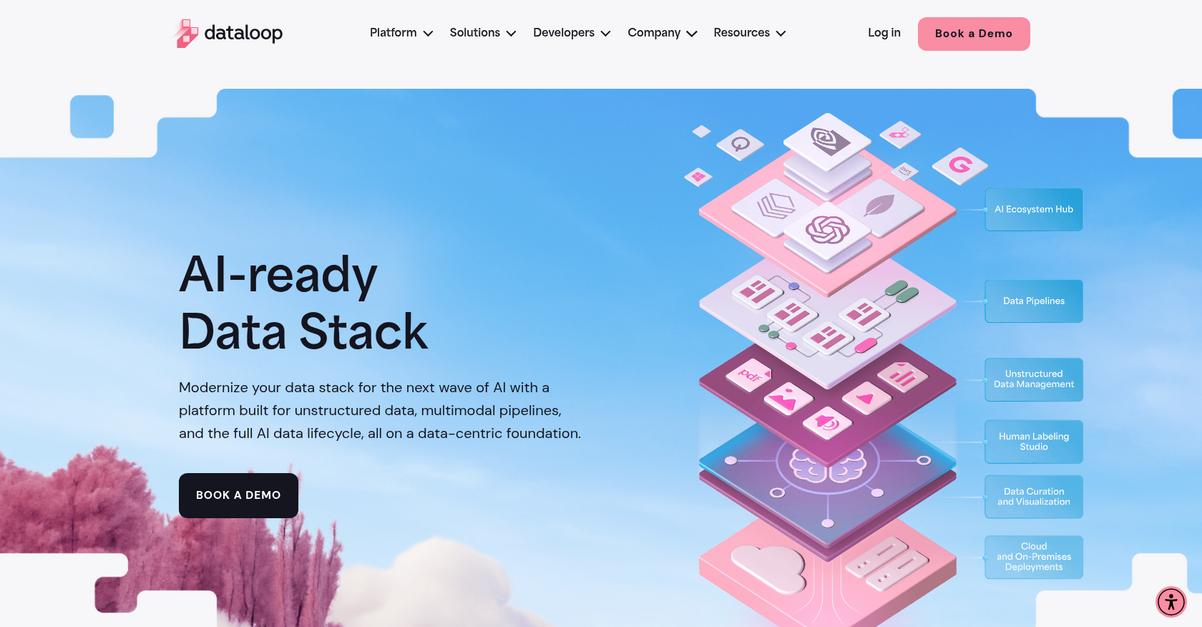
Struggling with consistent training data quality and efficiency?
Dataloop provides a comprehensive platform for unstructured data, multimodal pipelines, and the full AI data lifecycle.
This means you can explore, analyze, and curate vast quantities of data, relying on automated preprocessing and embeddings to identify similarities and find the data you need. You can seamlessly integrate data, models, and human feedback.
Here’s how you do it.
Dataloop helps you modernize your data stack, allowing you to easily integrate human feedback, and accelerate AI projects. This means you can build production-grade unstructured and semi-structured data pipelines in record time.
You can also use cutting-edge, off-the-shelf AI models or build your own, deploying to production without external tools. Additionally, orchestrate data, models, elements, and human feedback using a drag-and-drop interface or a Python SDK, enabling 95% automation across your average pipeline. Plus, leverage a marketplace of pre-created nodes, models, and pipelines, alongside a dedicated function-as-a-service offering. The result is 20x faster development and 70% time saved for your data organization.
All your teams can now work with data.
Before diving deeper, you might find my analysis of best audience response software helpful.
Key features:
- Full AI Data Lifecycle Management: Modernize your data stack with a platform for unstructured data and multimodal pipelines, handling the entire AI data lifecycle.
- Automated Data Preprocessing & Curation: Explore, analyze, and preprocess vast quantities of unstructured data, using embeddings to identify similarities, and curate/version data for AI applications.
- Integrated Model Management & Orchestration: Utilize off-the-shelf AI models or build your own, orchestrate data, models, and human feedback through customizable pipelines, and deploy directly to production.
Dataloop features, pricing, & alternatives →
Verdict: If your team is seeking to accelerate model iteration cycles and achieve consistent training data quality, Dataloop stands out as a best data labeling software. Its focus on human-in-the-loop precision, combined with a robust marketplace and advanced security features, provides a powerful solution for high-stakes AI applications like autonomous vehicle systems.
5. Encord
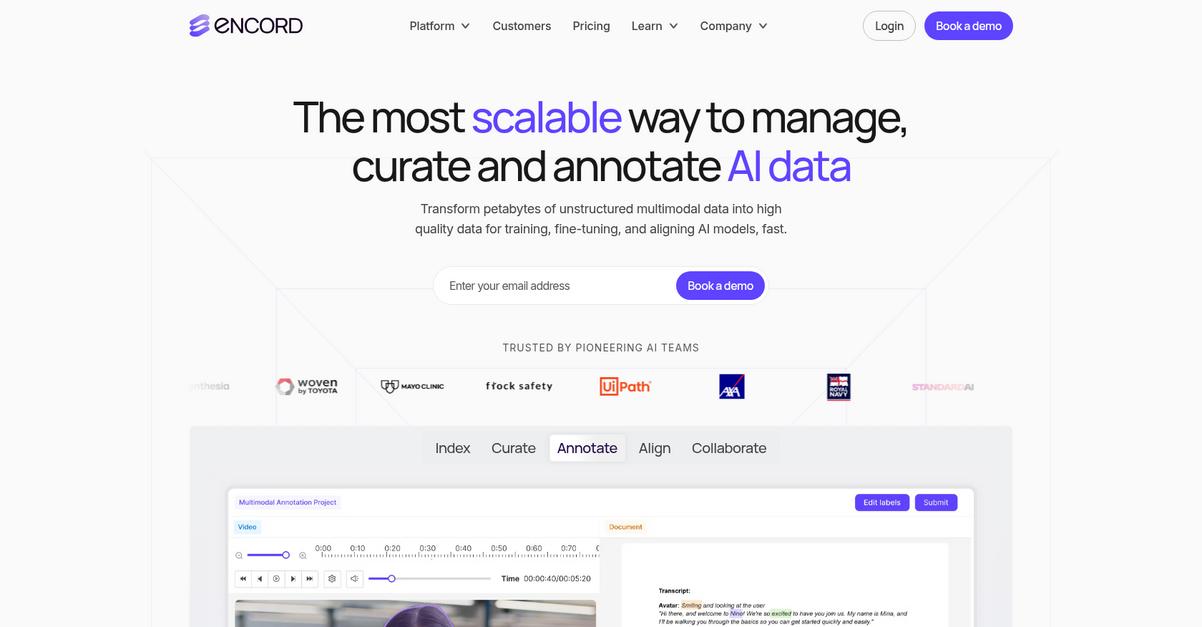
Struggling with diverse data and slow model iteration?
Encord offers a unified data layer to transform unstructured multimodal data into high-quality training data.
This means you can manage, curate, and annotate AI data at petabyte scale, addressing your challenge of handling vast and varied datasets.
It’s time to accelerate your AI deployment.
Encord helps you deploy production AI faster by providing best-in-class data curation, labeling, and model evaluation tools. This platform allows you to integrate AI agents into your project workflow for advanced human-in-the-loop and model labeling use cases. You can also align your AI models by validating them against your data to prioritize the most valuable data for training and fine-tuning. Additionally, Encord securely integrates with your cloud storage, MLOps tools, and infrastructure, ensuring compliance with SOC2, HIPAA, and GDPR standards.
The result: consistent training data quality and accelerated model cycles.
While discussing refined data and model performance, understanding data visualization tools is equally important for insights.
Key features:
- Scalable Data Management: Securely manage and organize millions of unstructured files with full visibility and traceability of data lineage, even across petabytes of data.
- Multimodal Annotation Tools: Generate multimodal labels at scale by integrating AI agents for advanced human-in-the-loop and model-assisted labeling across diverse data types like images, video, text, and sensor data.
- AI Model Alignment: Validate and fine-tune your AI models by surfacing, curating, and prioritizing the most valuable data, leading to a 20% increase in model performance for users like Automotus.
Encord features, pricing, & alternatives →
Verdict: For data scientists and ML engineers seeking to overcome data quality bottlenecks and accelerate model deployment, Encord stands out as the best data labeling software. Its unified platform delivers impressive results, including a 30% improvement in annotation accuracy and $600K saved annually for users like Standard AI.
6. V7
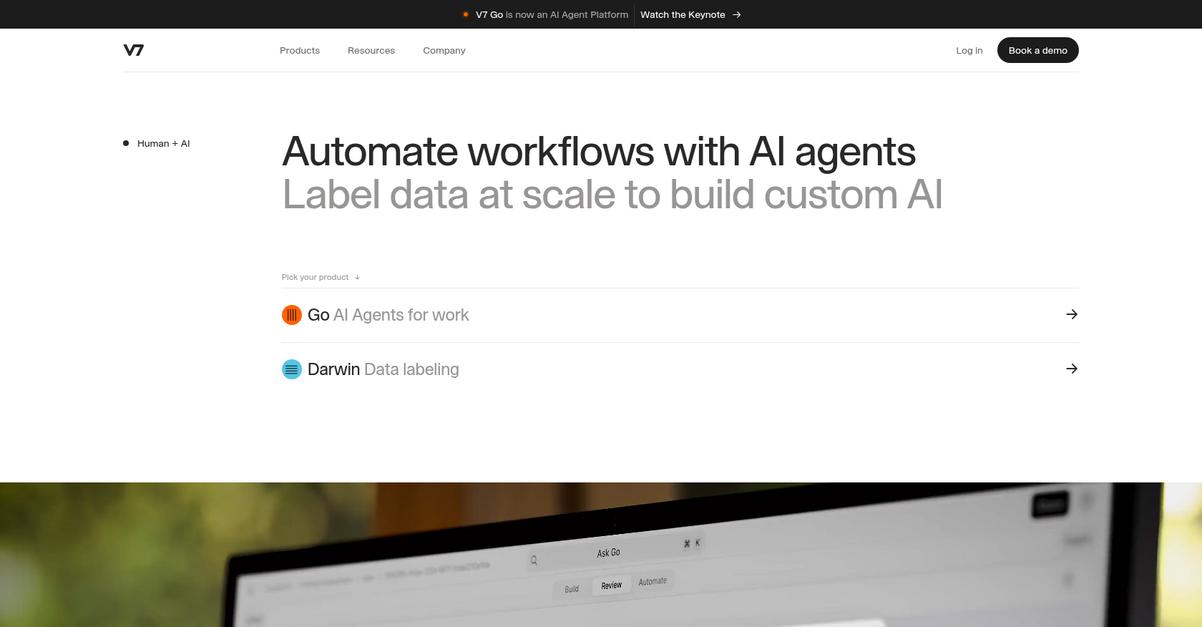
Struggling to achieve accurate training data at scale?
V7 offers solutions for both automating workflows with AI agents and labeling data at scale to build custom AI. This means your team can achieve high accuracy and fast deployment.
The platform helps your team operationalize labeling workflows to minimize labeling errors and repetitive motions, moving you from R&D to production swiftly.
Here’s how to boost your productivity.
V7 provides two core products: V7 Go for automating knowledge work and V7 Darwin for best-in-class data labeling. This dual approach helps you tackle diverse data challenges.
With Darwin, you can boost labeling speed and accuracy using AI-assisted tools like SAM2 and V7 Auto-Annotate, allowing human annotators to focus on complex and critical cases. Additionally, V7 Go supports multi-modal data extraction from various file formats, maintaining human-level accuracy across languages and layouts, streamlining document workflow automation and doubling your team’s productivity.
It’s built for CTOs, offering a centralized, no-code framework for LLMs that lets your team define AI tasks and those requiring human assistance, accelerating model iteration and ensuring robust performance.
Build trustworthy AI, trained on your data.
Before diving deeper, you might find my analysis of best electronic data capture software helpful for streamlining your data acquisition efforts.
Key features:
- AI-assisted labeling: Accelerate annotation speed and accuracy for computer vision and GenAI, utilizing tools like SAM2 and V7 Auto-Annotate to handle repetitive tasks.
- Automated workflows: Leverage AI agents in V7 Go to automate knowledge work, break down tasks for LLMs, and connect systems for seamless workflow integration at scale.
- Enterprise-grade security: Ensure data privacy with enterprise security features including end-to-end encryption, SOC 2 Type II certification, and robust access control.
V7 features, pricing, & alternatives →
Verdict: V7 stands out as the best data labeling software for scaling AI startups due to its powerful combination of AI-assisted labeling and workflow automation. It addresses key pain points like accuracy, scalability, and time-to-production, evident in its customer testimonials showing a 21x speed improvement and 35% productivity growth.
7. Label Studio
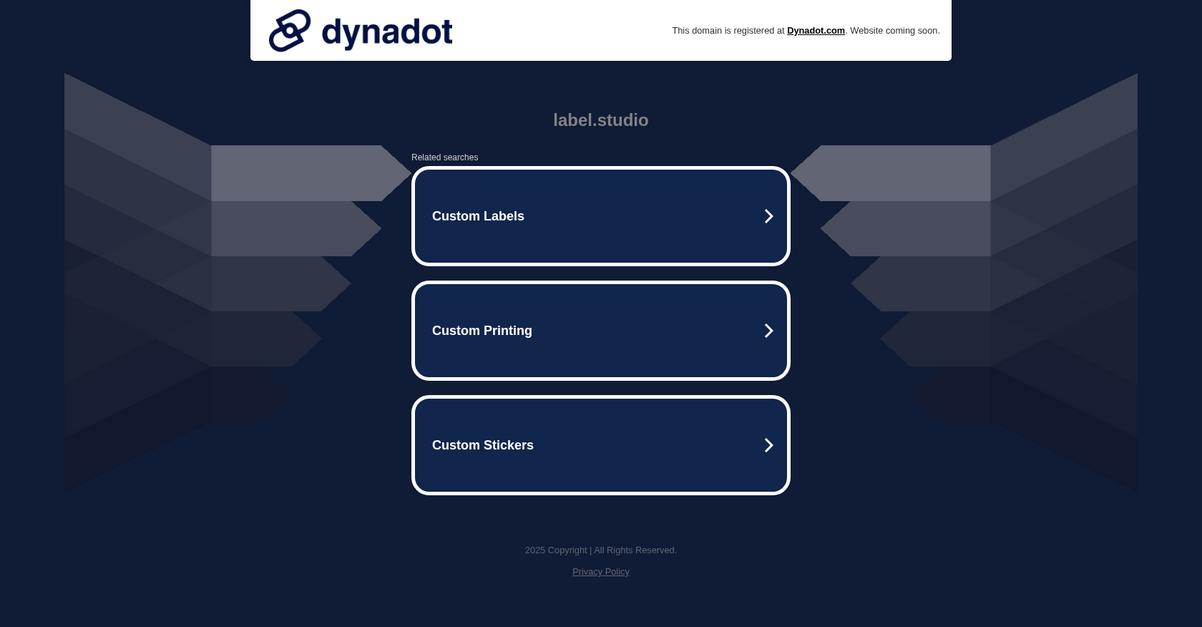
Struggling with slow, inaccurate data labeling for your AI?
I understand the pressure to deliver high-quality training data efficiently, especially with growing datasets. This means you need a tool that simplifies complexity and boosts accuracy.
Label Studio offers an open source platform, providing flexibility to avoid vendor lock-in, which is crucial for maintaining control over your ML workflows. This helps you navigate the crowded market confidently.
Here’s how Label Studio empowers your data labeling efforts.
It offers a customizable solution that supports various data modalities including images, text, and audio. This flexibility helps you manage diverse labeling tasks efficiently, accelerating your model iteration cycles. You can adapt it to your specific project needs, ensuring consistent training data quality. Additionally, its design encourages collaborative workflows, allowing your team to work together seamlessly to minimize annotation errors and enhance overall data integrity.
Achieve consistent training data quality and accelerated model iteration.
Key features:
- Open Source Platform: Provides flexibility and customization options, reducing vendor lock-in and allowing full control over your data labeling environment and processes.
- Multi-modality Support: Handles diverse data types like images, text, audio, and video, ensuring comprehensive labeling capabilities for various AI applications.
- Collaborative Workflows: Facilitates team annotation and review, streamlining the labeling process and improving data quality through shared efforts.
Label Studio features, pricing, & alternatives →
Verdict: For data scientists and ML engineers prioritizing flexibility, collaboration, and multi-modality support without vendor lock-in, Label Studio stands out as a strong contender for the best data labeling software, directly addressing your pain points.
Conclusion
Bad training data kills AI projects.
I know choosing the right tool from a crowded market is overwhelming. This indecision slows down your entire AI development lifecycle and puts projects at risk.
According to Neptune.ai, proper software adoption enables organizations to improve data quality and streamline ML workflows. This is the critical foundation for building reliable AI, not just a minor optimization for your team.
Here’s my top recommendation.
From my review, Labelbox is the clear winner. It’s built to solve the core challenge of creating consistent, high-quality data for scaling your AI models.
Their users report a 2X increase in data quality. When you implement the best data labeling software like Labelbox, you’re not just annotating data—you’re accelerating your entire model’s performance.
I suggest you start a free trial of Labelbox to see how its data factory can directly transform your own projects.
Your models will improve much faster.
